By David P. Diaz, Ed.D.
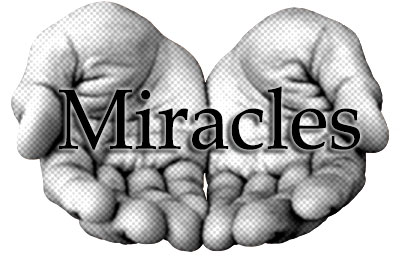
Miracles represent a significant stumbling block to those who ponder the accuracy of the Bible and the truth of the Christian message.1 If miraculous events are impossible or if the accounts of miracles can be shown to be false, then the Bible cannot represent the inerrant word of God.2
In this article, the author will first attempt to place biblical miracles in their proper context by addressing two key questions: “What role do miracles play in the Bible?” and “How are biblical miracles defined?” Next, the author will provide a Christian defense of miracles by focusing on three questions: “Are miracles possible?”; “How did prominent scholars critique miracles?”; “Was belief in miracles by Jesus’s followers due to lack of sophistication and understanding of the laws of nature?”
The Role of Miracles in the Bible
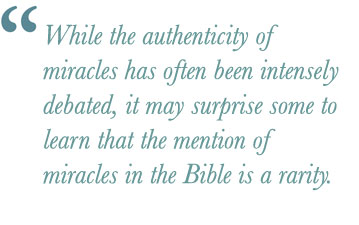
While the authenticity of miracles has been intensely debated, it may surprise some to learn that the mention of miracles in the Bible is a rarity. Although these supernatural events were memorably recorded in the Old and New Testaments, they surfaced only infrequently. Indeed, as philosopher Richard Howe has noted: “In the vast millennia of biblical history, miracles are not that common… there is a purpose of miracles surrounding God’s working His revelation and will with mankind” (2014, 633).
Howe explained the purpose of miracles as follows: “I contend that strictly speaking, miracles are given by God to vindicate His messenger and confirm the message” (Ibid., 634, italics added). In other words, in the midst of the pantheon of so-called gods in the ancient Near East, Yahweh—the sovereign Creator-God of the Hebrews—periodically elected to affirm his divine will and supremacy and confirm the authority of his messengers through the outworking of miracles.
Besides their lack of frequency, most of the 126+ miraculous events in the Bible are clustered around certain people like Moses, Joshua, the Prophets of Israel, and Jesus of Nazareth. Thus, when the Bible is carefully examined, it becomes evident that miracles were (1) relatively infrequent, (2) centered around specifically chosen people, and (3) used to authenticate the divine commission of the messengers of God.3
Definition of “Miracle”
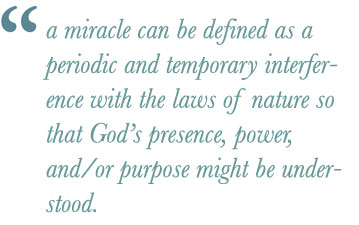
The late literary scholar and Christian apologist C. S. Lewis defined miracles as “an interference with Nature by supernatural power” (1947, 5).4 If God exists and created the universe, then it is not a stretch to think he can intercede in the natural world to fulfill his divine plans. Thus, for this article, a biblical miracle will be defined as any event in which God temporarily intervenes in the natural world so that his presence, power, and purpose might be understood and believed.5
Are Miracles Possible?
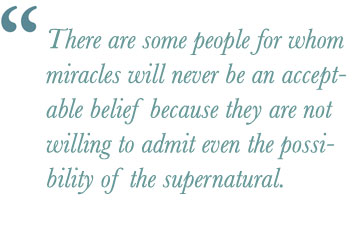
There are some people for whom miracles will never be an acceptable belief because they are not willing to admit even the possibility of a supernatural sphere of influence. No matter what experiences are encountered and no matter how the miracle claims of others are perceived, true skeptics never seem to regard these experiences or claims as pointing to actual miracles. Such people may lack the discipline or, perhaps, the desire to rigorously examine purported miraculous events on a case-by-case basis. To be fair, there are certain professional disciplines in which such skepticism is allowed and even required. Science, history, medicine, and related fields are not at liberty to accept miraculous explanations since their methodological assumptions don’t allow it. In most scientific disciplines, all proposed hypotheses must be empirically falsifiable or explainable. In other words, all proposed explanations must be naturalistic ones. Such a methodology is called “methodological naturalism.”6 Thus, even when researchers conclude that a naturalistic hypothesis is “improbable” or “is not a reasonable explanation,” scientists cannot legitimately conclude that a “miracle” is the best or even a better explanation. Scientific methodology entertains only naturalistic causes. That is why disciplines such as philosophy and theology, which are not limited by the assumption of methodological naturalism, may be required to fully clarify purported metaphysical phenomena.
From the Christian perspective, the likelihood of miracles hinges on the existence of God. If God exists and created the universe, including the laws of nature, then it is not a stretch to believe that he can intervene in the operation of those laws when he so chooses. However, if God does not exist, then the biblical miracles attributed to his power represent nothing more than illusions or wishful thinking. Therefore, if one is to show that the miracles in the Bible are at least possible or plausible, he or she must first bring forth good reasons to believe in the existence of God.7
Spinoza and Hume Against Miracles
While philosophers and theologians have an important role to play when it comes to metaphysical topics, many have rejected and sought to discredit miracles. For example, Benedict de Spinoza (1632–1677), a Jewish-Dutch philosopher, attacked miracles head-on and, in the process. Spinoza understood miracles to be a violation of natural law. Indeed, he considered the claim that God could intervene in the natural course of events to be absurd: “I have taken miracles and ignorance as equivalent terms” (Spinoza 1996).
Spinoza’s argument against miracles can be summarized as follows: (1) The laws of nature flow from the necessity and perfection of the divine nature (i.e., the divine nature = the laws of nature);8 (2) Nothing can violate the laws of nature since nature is immutable (i.e., fixed, set, unchanging); (3) A miracle would be a violation of the laws of nature; (4) Therefore, miracles are impossible.
The problem here is that Spinoza patently begs the question!9 The key premise is number 2: “Nothing can violate the laws of nature since nature is immutable.” If Spinoza knew in advance that natural laws are unchanging and unchangeable, then, of course, miracles would be impossible. But, there is no way for Spinoza to prove this premise unless he already knows that violations of natural laws (i.e., miracles) are impossible. Instead, he merely assumed that premise 2 was true. Spinoza, thus, commits the fallacy of assuming the very thing he is trying to prove.
Moreover, Spinoza could not appeal to the improbability of miraculous events (compared to non-miraculous events) since miracles are improbable by definition. Nevertheless, improbable events do happen, including the origin and fine-tuning of the universe, the appearance of life from non-living materials, and the appearance of rational minds from mindless matter and blind cause and effect (to name but a few).
David Hume (1711–1776) was perhaps best known for his philosophical skepticism, and he was especially skeptical of miracles. Following the naturalistic determinism of Spinoza, Hume reasoned as follows (1993, 76):
A miracle is a violation of the laws of nature; and as a firm and unalterable experience has established these laws, the proof against a miracle, from the very nature of the fact, is as entire as any argument from experience can possibly be imagined.
While Spinoza tried to show that miracles were actually impossible, Hume most likely thought them to be merely incredible (i.e., difficult or nearly impossible to believe). Hume’s line of reasoning was an argument from experience. According to Hume, purported miracles represent a contradiction to our uniform experience against them. Thus, any claim of a miracle must be mistaken. For Hume, a uniform experience against miracles acts as a kind of proof that they do not occur.
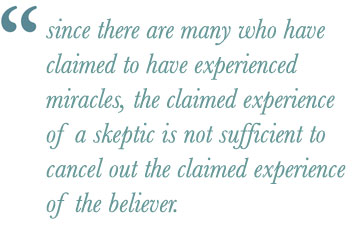
It is not always clear exactly how Hume meant his argument against miracles to be understood. Either he was arguing that he already knew that all human experiences were uniform against miracles, or he knew that the experiences of some people were uniform against miracles. If it’s the former, then he begged the question. That is, if Hume claimed to know that all human experiences are uniform against miracles, he assumed what he was trying to prove. For unless one knows all things, one cannot know with certainty that all human experiences are uniform against miracles. And, if one cannot know that all human experience is uniform against miracles, then one cannot know that the laws of nature cannot be violated based solely on a claim of uniform experience. The claim that all humans have “unalterable experience” against miracles is the very point at issue. Accordingly, one cannot use as proof the very assertion that is being questioned. Furthermore, Hume, like Spinoza, could not appeal to the improbability of miracles compared to non-miraculous events because such a strategy would count against all improbable events, which we know can and do happen, no matter how improbable.
If, on the other hand, Hume was referring to the experiences of some humans (i.e., those who have not experienced miracles), then he erred by special pleading.10 In other words, since many have claimed to experience miracles, the claimed experience of a skeptic is not sufficient to cancel out the claimed experience of a believer. Indeed, “hundreds of millions of people in today’s world claim to have witnessed supernatural healings” (Keener 2012, Kindle location 5068). Thus, each and every miracle claim, whether found in the Bible or in the modern world, cannot be dismissed outright but must be considered separately and the evidence assessed appropriately on a case-by-case basis.
Was Gullibility or Ignorance by Ancient People a Critical Factor in Accepting Miracles?
There are some who would have us believe that people in biblical times were more apt to trust in the existence of miracles simply because they were unsophisticated and generally ignorant of the laws of nature. Had they understood natural laws, so the argument goes, they would have correctly attributed all the supposed supernatural events to natural causes. I can understand why some would think this, and I can even agree that it may be true in some instances. Just as non-believers will often not believe in miracles because of their predisposition against the supernatural, believers may read miracles into natural events because of bias or ignorance. Nevertheless, while one’s belief is not proof that miracles exist, neither is it evidence against miracles. The fact that someone believes something doesn’t mean it’s not true (e.g., just because I believe the sun will rise tomorrow doesn’t mean it won’t). The key point is that neither belief nor unbelief necessarily establishes the truth (or falsity) of miracle claims. Each miracle claim must be considered separately and assessed critically and comprehensively to shed light on its potential authenticity.
Moreover, it seems abundantly clear that people in ancient times did have a general understanding of the natural order and could see the difference between regularly occurring patterns of nature and exceptions to such patterns. Miracle claims would have no relevance outside of the consistency, regularity, pattern, and structure of the laws that operate in the world. The point is that a miracle claim, in some sense, presupposes the knowledge of a natural order. It was only because they understood the regularity of nature that miracles could be interpreted by biblical characters as interventions by God.
In New Testament times, the understanding of natural law was displayed quite vividly by Joseph’s reaction to the unexpected pregnancy of Mary (Matt 1:18–19):
This is how the birth of Jesus the Messiah came about: His mother Mary was pledged to be married to Joseph, but before they came together, she was found to be pregnant through the Holy Spirit. Because Joseph, her husband, was faithful to the law and yet did not want to expose her to public disgrace, he had in mind to divorce her quietly.
Joseph rightly understood that according to the regularities observed in nature, conception and pregnancy required intercourse. The fact that he had not come together with Mary could, in his mind, mean only one thing: infidelity. Thus, Joseph desired to divorce Mary quietly. His mistaken notion was not that he didn’t understand natural law but that he didn’t realize that God had intervened. This fact had to be pointed out to him by an angel of the Lord who appeared in a dream, saying, “Joseph, son of David, do not be afraid to take Mary as your wife, for that which has been conceived in her is of the Holy Spirit” (Matt 1:20).
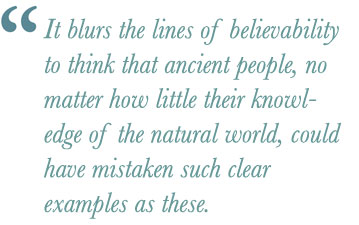
Miracle claims are strengthened when events are simultaneously witnessed by groups of people. Because a good number of the miracles recorded in the Bible were witnessed by many people at the same time; it is doubtful that all were mistaken in believing a genuine miracle took place when it didn’t. For example, what led people to believe that Lazarus (John 11:1–46)—who was dead, body-wrapped, and entombed for four days—was restored to life by Jesus? Was it gullibility or wishful thinking that influenced all those people to believe? Or could it have simply been that four days earlier, Lazarus was dead and buried, but when Jesus called him forth from the tomb, he rose from the dead?
In another example, could Jesus’s instantaneous healing of a man who was born blind (John 9:1–7) have been misunderstood by the people who witnessed the event? Was nobody familiar with this man’s background? Did he not have friends and family who could verify that he had been blind his entire life? It blurs the lines of believability to think that ancient people, no matter how little their knowledge of the natural world, could have mistaken such clear examples as these.
So, while it is one thing to claim that some ancient people read miracles into natural events, it is quite another to claim that each miracle recorded in the Bible was believed on the basis of ignorance of natural laws or wishful thinking.
Modern Miracles
The topic of modern-day miracles diverges a bit from biblical miracles. In one case, we have those miracles that are recorded in the Bible, which are separated from us in history, culture, and language. On the other hand, we have purported modern miracles that have been wrought in various places worldwide and to a generally more sophisticated audience.
In today’s world, purported miracles are often witnessed by people who can record and quickly disseminate accounts of the event. It is easy to understand how, in the mid-1700s, David Hume could think that all human experiences were uniform against the existence of miracles. His knowledge of the world was limited. However, the vast majority of people living today have enough knowledge of world events to encounter and assess the truth of claims of miracles, especially when reliable witnesses and meticulously documented cases of such events are present. Indeed, there are numerous examples of such healings and many reliable witnesses.
Physicians tend to be excellent witnesses when it comes to medical miracles because they can often confirm a patient’s medical history and have sometimes personally examined the patient. They may also be more critical in terms of evaluating miracle claims because of their academic training and experience.
Craig S. Keener (2012, Kindle location 8880) related the testimony of Dr. Martin Biery, a specialist in spinal cord surgery at a hospital in California. Biery testified that, in an open prayer service, he witnessed patients “whose spines were frozen get instantaneous freedom and move and bend in all directions without pain.” Another physician, Dr. Viola Frymann (Ibid., Kindle location 8885), testified to cures she witnessed, including a “child, whose arm and leg were paralyzed from cerebral palsy… healed before her eyes.” Dr. James Blackann witnessed a case where a boy was born with a deformed foot, which normally could only be corrected by major surgery followed by a lengthy period of convalescence. According to Blackann, when the boy was prayed for, he “walked up to the stage, ran back and forth, and skipped” (Ibid., Kindle location 8891). Dr. Blackann also stated: “I’ve seen massive cysts disperse immediately and I’ve seen spastic conditions disappear. I’ve seen arthritic spines and limbs instantly freed in [healing] services” (Ibid.)
Keener (Ibid., Kindle locations 5925–5931) also related examples of people who were healed of deafness and muteness:
Among the many persons healed of deafness and muteness was a young woman deaf and mute for twelve years, and on another occasion ‘an old man who had been deaf in both ears since he was a young man was instantly healed.’ Instant healing through prayer also came to a twenty-eight-year-old who had been deaf and mute all his life and was instantly healed.
These healings, as well as many others, have been carefully documented by a number of writers. For more examples of documented miracle claims, the author recommends the book entitled Miracles: The Credibility of the New Testament Accounts (2011). This two-volume work, written by Craig S. Keener, not only establishes the credibility of miracles but also thoroughly documents hundreds, if not thousands, of modern-day miracles from around the globe.11
Suspension of Disbelief
What would happen if a skeptic were to temporarily suspend her disbelief in the existence of God? Once the existence of God has been accepted, even for the sake of argument, then there is no security against miracles. As C. S. Lewis (1947, 109) pointed out: “That is the bargain. Theology says to you in effect, ‘Admit God and with Him the risk of a few miracles, and I in return will ratify your faith in uniformity as regards the overwhelming majority of events.’” What Lewis was saying is that God’s existence makes sense out of the numerous seemingly inexplicable phenomena in the universe;12 including miracles.
If one’s assumptions eliminate supernatural causes by definition, then, of course, one would never agree that a miracle has happened in the world. However, if one accepts, even provisionally, a deity who acts purposefully in history, then it is not unreasonable to accept reliable eyewitness testimony to count in favor of miracles. In other words, a rational and fair-minded person should take the accounts of miracles seriously, especially when those claims are put forth by reliable eyewitnesses.
Conclusion
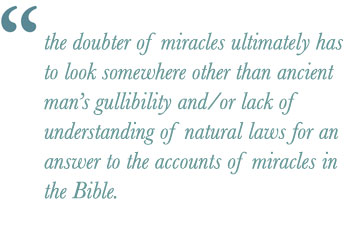
In my opinion, tales of miracles would have had little or no impact on ancient people unless the accounts had some credibility. While some incidents may have been embellished or wrongly credited, it doesn’t seem plausible that every purported miracle could have been attributable to natural laws or a lack of sophistication of the witnesses. Therefore, the doubter of miracles ultimately has to look somewhere other than ancient man’s gullibility and/or lack of understanding for an answer to all biblical accounts of miracles.
Though early man’s knowledge of the laws of nature was, no doubt, incomplete, he nevertheless knew enough to understand that there were regular, recurring patterns in nature and that an interruption of these patterns was not normal. While it may be true that, on occasion, people in biblical times mistakenly understood a natural event to be a miracle, it is highly unlikely that they could have been fooled in every instance.
As a counterpoint, maybe the skeptic is mistaken. Perhaps it is the doubter of miracles who, on the basis of wishful thinking or a sincere desire for it to be so, mistakingly concludes that a miraculous event is a natural one.
If miracles are possible, then simply rejecting them without examining the evidence is tantamount to rational suicide. Indeed, according to Keener (2012, Kindle location 3685):
As events, phenomena that people interpret as miracles can be examined scientifically and historically…. Regardless of causation, a person either did recover from a disease or did not, although we quite often lack access to information that makes the initial diagnosis certain.
Keener further notes: “To exclude the possibility of some sort of suprahuman and possibly supernatural intelligent causation is to a priori rule out what may be a very plausible explanation of some evidence—yet many Western intellectuals do just this” (2012, Kindle location 3705).
Ultimately, accounts of miracles must be judged on their own merits. If reports of miracles are found in the biblical text, they can be assessed using the tools of forensic science, including clues from circumstantial evidence and historical analysis, to determine the plausibility of such claims. Purported modern-day miracles can be examined by incorporating many of the same principles and practices used in empirical science (i.e., observation, testing, case studies, descriptive statistics, etc.). Moreover, theology and philosophy can also play a role in examining the accounts of miracles and in deciding the rational basis for a belief in specific miracles.
In summary, the Bible claims that the universe and the entire natural order were created by God (Gen 1:14–18) and are controlled by Him. Interventions by God into the natural order are called miracles and said miracles are described in various places in the Bible. From a Christian viewpoint, it is only by disproving the existence of God that one can, ultimately, disprove miracles. Nevertheless, if such a God exists, He most certainly can suspend the laws He created in order to produce miraculous events.
About the Author
David P. Diaz, Ed.D., is an independent researcher and retired college professor. His writings have ranged from peer-reviewed technical articles to his memoir, which won the 2006 American Book Award. Dr. Diaz holds a Bachelor’s and Master’s degree in Science from California Polytechnic State University, a Master of Arts in Philosophical Apologetics from Houston Christian University, and a Doctor of Education specializing in Computing and Information Technology from Nova Southeastern University.
Bibliography
Geisler, Norman. Miracles and the Modern Mind: A Defense of Biblical Miracles. Kindle Ed. Matthews, NC: Bastion Books, 2012.
Geivett, R. Douglas, and Gary R. Habermas, eds. In defense of miracles: A comprehensive case for god’s actions in history. Downers Grove, IL: IVP Academic, 1997.
Howe, R. G. “A Defense of the Supernatural.” In The Jesus Quest: The Danger from Within edited by N. L. Geisler and F. D. Farnell, 621–672. Maitland, FL: Xulon Press, 2014.
Hume, David. An Enquiry Concerning Human Understanding: A Letter from a Gentleman to His Friend in Edinburgh. 2nd ed. Indianapolis, IN: Hackett, 1993.
Keener, Craig S. Miracles: The Credibility of the New Testament Accounts. Kindle ed. Grand Rapids, MI: Baker Academic, 2012.
Lewis, C. S. Miracles: A Preliminary Study. New York, NY: Macmillan Company, 1947.
Spinoza, Baruch. Letters to Friend and Foe. New York, NY: Philosophical Library, 1996.
Strobel, Lee. The Case for Miracles: A Journalist Investigates Evidence for the Supernatural: Student Edition. Grand Rapids, MI: Zondervan, 2018.
Footnotes
- It should be noted that the topic of miracles cannot be fully addressed by the disciplines of history or science since they operate under the assumption that all historical events have purely naturalistic causes. Therefore, the current defense of biblical miracles will be conducted not only within a historical frame of reference but also within theistic and philosophical perspectives, which are not limited by the same methodological assumption.
- Though inerrancy is not a topic of discussion in this essay, the reliability, accuracy, and truth of the Bible are of paramount importance to the topic of miracles. Thus, these topics should be considered separately and comprehensively.
- For this article, the use of the term “God” will refer to the God of Christian theism, including all corresponding traditional attributes and powers as described in the Bible. The author proposes only the possibility that the God of Christian theism exists and may, therefore, influence nature in ways that humans cannot. What is said in this essay about miracles is contingent on the existence of God, and although arguments for the existence of God are not included in this article, they have been presented elsewhere (see footnote 7).
- Lewis’s book, Miracles (1947), is an interesting and insightful theological and philosophical discussion of miracles. This brief but important work is a classic in the field by a significant figure in Christian apologetics. That it is still in print after all these years is a testament to its popularity.
- While this definition applies specifically to those miracles found in the Bible, it can also be loosely applied to purported “modern miracles” that occur within a Christian theistic context.
- Methodological naturalism, also referred to as “the scientific method,” represents a strategy for studying the world in which scientists look only for naturalistic causes. In other words, for purely methodological purposes, scientists choose not to look for nor consider supernatural causes during the process of conducting experimental or other types of research.
- See the following TIBP articles for arguments for the existence of God: (1) “A Brief Look at the Ontological Argument,” http://thingsibelieveproject.net/a-brief-look-at-the-ontological-argument/ (2) “The Kalam Cosmological Argument,” http://thingsibelieveproject.net/the-kalam-cosmological-argument/ (3) “God v. Matter As the Cause of the Universe – Part 1” http://thingsibelieveproject.net/god-v-matter-as-the-cause-of-the-universe-part-1/ and (4) “God v. Matter as the Cause of the Universe – Part 2” http://thingsibelieveproject.net/god-v-matter-as-the-cause-of-the-universe-part-2/ (5) “A Cosmological Argument for the Existence of God” http://thingsibelieveproject.net/a-cosmological-argument-for-the-existence-of-god/
- Spinoza was a pantheist. Pantheism is a belief that God is impersonal and identical to nature.
- The fallacy of begging the question (petitio principii) occurs when the proposition one is trying to establish is unwittingly (or unwittingly) assumed. This is evident when the general premise could not be known to be true unless the conclusion is known to be true; so, in making the argument, the conclusion is assumed true from the beginning (From Hansen, Hans, “Fallacies,” The Stanford Encyclopedia of Philosophy (Fall 2019 Edition), Edward N. Zalta (ed.), URL = <https://plato.stanford.edu/archives/fall2019/entries/fallacies/>.
- Special pleading is used here to refer to any argument in which the speakers deliberately ignore aspects that are unfavorable to their point of view.
- For a popular treatment of miracles written in a highly readable style, I recommend the book The Case for Miracles by Lee Strobel (2018).
- Examples of “seemingly inexplicable phenomena” include: the origin of the universe, the appearance of physical laws (which make science possible), the fine-tuning of the universe for life, the origin of life from lifeless matter, the mind-body problem, the problem of free will in a deterministic world, the appearance of mind from mindless matter, our sense of objective moral standards, etc.